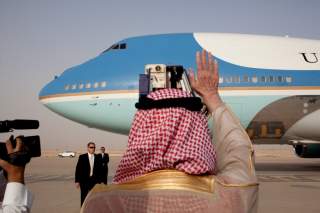America's Core Middle East Interests Are Already Secure
More U.S. troops would make things worse.
The idea that significant U.S. military forces need to be maintained in the region to deter Iranian violations of the agreement misconstrues what likely brought Iran to the negotiating table. It was not primarily the fear of a U.S. military attack against its nuclear program; rather, it was the economic damage wrought by multilateral sanctions. Accordingly, deterring Iran from cheating will require a credible threat to reimpose those sanctions, not a relatively less meaningful threat to bomb some nuclear facilities.
In sum, the United States will have a broad array of effective nonkinetic options to handle the WMD proliferation problem in the Middle East. Even if selective military strikes were necessary to destroy nuclear infrastructure, these operations would not require a large peacetime U.S. military presence in the region, but rather the ability to rapidly project conventional force from the United States or other theaters, American sea-based assets or facilities in and around the Arabian Sea—that is, with the kind of military posture the United States maintained in the region between 1983 and 1991.
CORE U.S. INTERESTS in the Middle East are well protected and could remain so with even fewer U.S. military forces stationed in the region. Additional applications of military might are not required or even useful for protecting these interests.
Instead of increased military interventionism, the United States should adopt the principle of “minimum essential engagement” in the Middle East. As in any area where the United States has interests, it should remain engaged and retain sufficient military and nonmilitary tools to defend them. But because the United States is broadly disliked and ineffective at improving governance in the region, because major U.S. efforts there often backfire, and because U.S. resources are scarce and needed elsewhere, the United States should limit that engagement to what is absolutely necessary to protect core interests. This principle would allow a gradual decrease in the current onshore presence of U.S. military forces in the region, including in the Persian Gulf. It would certainly counsel against involvement in the various Middle Eastern civil wars or new transformational initiatives to reform Arab domestic governance or other forms of social engineering.
Any U.S. strategy that avoids deeper involvement in Middle Eastern civil wars or reduces U.S. military deployments in the region will irritate U.S. partners. Many of them have long relied on Washington to assume defense commitments that they would rather not. They have asserted, like many voices in the United States, that U.S. caution and lack of leadership, which are usually code words for a refusal to use military force, will create an impression of weakness and open up a vacuum that other powers—particularly Russia or Iran—will exploit. In this view, Russia’s intervention in Syria as well as Iran’s meddling in the civil wars in Iraq, Syria and Yemen prove the point.
Such arguments resonate in the United States because they tap into a deeply held view that Washington has the power and the responsibility to order the world. This has never really been true and is even less the case today with new powers rising. Under such circumstances, the United States will need to limit its commitments to what is truly important. Better governance in places like Syria and Iraq is important to regional states, but it is not easy to achieve, especially for outside powers—and even if achieved, it yields no geopolitical prize. The U.S. invasion of Iraq made the United States more influential in Iraqi governance than it was when Saddam Hussein ruled Iraq. But it did not make the United States stronger. The United States does not need control of Iraq to protect its core interests in the region. In Syria, Russia will likely find that the game is not worth the candle.
This conclusion is not reflected in the current U.S. presidential campaign and in the views expressed by the two presumptive nominees. Both Hillary Clinton and Donald Trump have proposed increasing U.S. military activity in the Middle East. As political scientist Stephen Walt has noted, the tendency in the U.S. domestic political debate to equate any aversion to the use of military force with weakness and indecisive leadership is one reason the military instrument features so prominently in these discussions. The failure to solve the region’s humanitarian problems, reflected on a daily basis in heartrending detail on various news outlets, presents a golden opportunity for the two leading presidential candidates to offer a more assertive policy toward the region backed by superior American military power. There are only two problems with the remedies the American public will be hearing for Middle Eastern problems between now and November 2016. First, they aren’t necessary and, second, they will probably make things worse instead of better.
Jeremy Shapiro is director of research at the European Council on Foreign Relations. Richard Sokolsky is a senior associate at the Carnegie Endowment for International Peace. Both are former members of the secretary of state’s policy planning staff.
Image: President Barack Obama waves as he departs King Khalid International Airport in Riyadh. Flickr/The White House.

